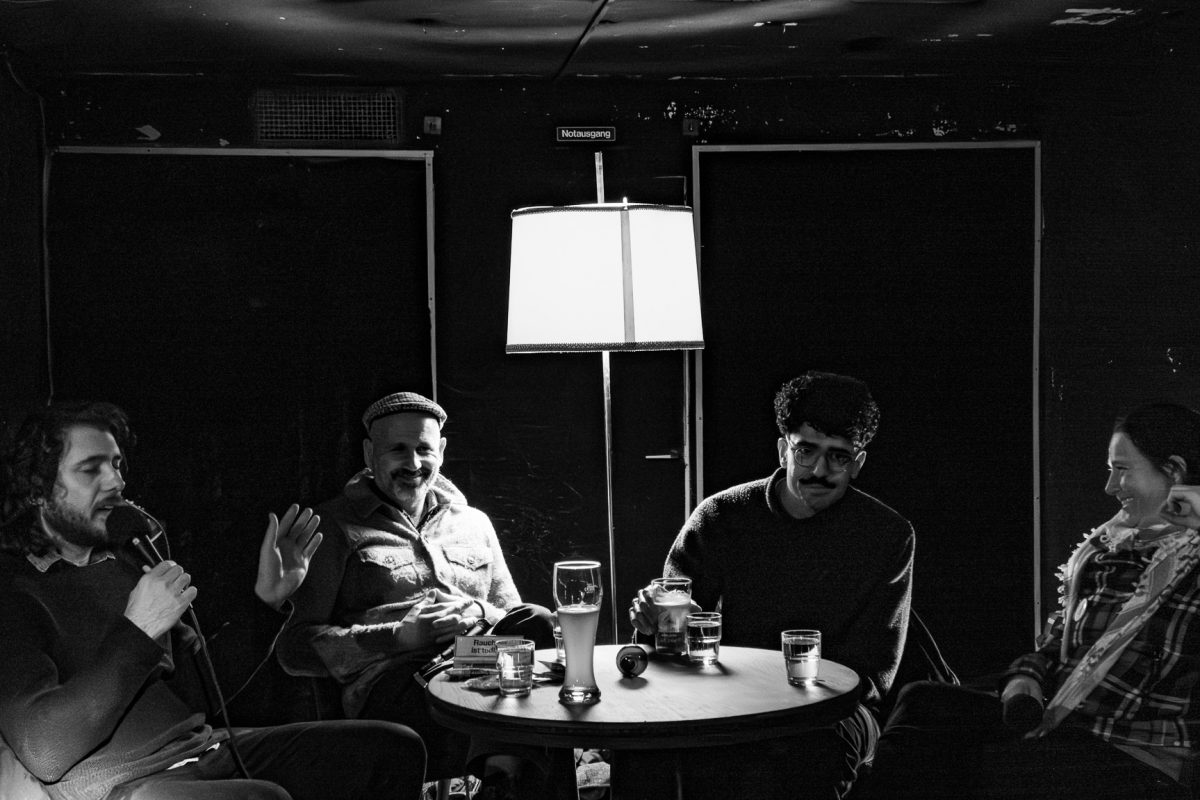Last Thursday, the “Antideutsch” club ://about blank in Berlin held a panel discussion on antisemitism. How did you experience the event as a Jewish Berlin leftist?
We in Berlin’s Jewish anti-Zionist community, which includes the Jüdische Stimme and many others, were acutely aware that we would not be welcome at this conversation about us. Some of us have already been made notorious either through journalism or social media. So we needed to plan to enter ://about blank discreetly, spreading out in the line and feigning unfamiliarity from one another. I even dressed to look antideutsch, in all black with skinny jeans and a bomber jacket.
The line was full of white friends and couples, some that I’d even seen on Grindr before, who were scowling at the pro-Palestine protest across the street, which was in fact, led by Jews. As people started entering, I quickly witnessed how at least two Jewish comrades who are well known for their activism were denied entry. I was one of only two anti-Zionist Jews who got in undercover. The crowd was otherwise German and non-Jewish — except for a handful of Israeli gay men seemingly friends with panelist Daniel-Ryan Spaulding.
An interesting note of mention is that the event forbade audio or visual recording of the panel, which is quite unusual for panels in Berlin. Certainly pro-Palestine discussions I attend are welcome to the public recording.
If there weren’t many Jewish people present, who was actually discussing?
Four of the five panelists were a somewhat random selection of non-Jewish self-proclaimed experts on anti-semitism. ://about blank had originally announced an event about anti-semitism with no Semitic speakers. After they were panned online, they deleted the post and added one Jewish panelist at the last minute.
The most well known speaker was Daniel-Ryan Spaulding, a fellow gay Canadian and a comedian. In the last half year he has become, in the words of panel moderator Anastasia Tikhomirova, “the leading voice of Zionism.” He is not Jewish, but wears a Star of David necklace and has been known to refer to critical Jews as “kapos.” He is known to publicly fetishize Israeli dicks. The Zionist movement has welcomed him as an expert, in spite of his often contradictory and reductive approach.
Throughout the 2.5 hour discussion, none of the speakers was able to provide any concrete opinions, facts, or strategies about hatred toward Jewish people nor strategies on Jewish safety. During the redundant and self-congratulatory discussions, I often found myself zoning out. When I managed to listen carefully, I was disturbed by the weak arguments against the pro-Palestine rally that my friends were organizing across the street.
The claim of the event was that artists and leftists are antisemitic and “lack empathy” (presumably for the Israeli government). What kind of empathy did the speakers display?
They seemed to forget the theme of empathy entirely until the last 30 minutes. And when they were reminded, they focused the discussion on how pro-Palestine activists (including the Jews among us) lacked empathy, whereas they, the Antideutsche, are “doing a pretty good job at empathy,” in Spaulding’s words. They would regularly gesture to the Jewish-led demonstration across the street and accuse them of lacking empathy in the fight against antisemitism.
At one point, Spaulding found himself on a tangent about the atrocities of what is happening in Gaza, and he seemed to become quite emotional. But before our eyes, he shifted back into his comedic persona and said “oh, not me getting emotional!” He did not go far enough in his empathy to call for an immediate ceasefire, or to argue for an end to weapons shipments that are being used to commit genocide.
How would you describe the feelings in Berlin’s Jewish community right now? The German press reports about a spike in antisemitic incidents, but when you dig into the numbers, an “attack” might consist in someone peacefully holding up a sign against the genocide in Gaza — and that person might be Jewish. And then we’ve seen a terrible wave of repression against left-wing Jews, including assaults, arrests, and firings.
I can only speak for those of us who are anti-Zionists. Before October 7, I wasn’t involved in any Jewish community here in Berlin. (Where did they go? This is yet another reminder of the genocide that took place here.) But in the last six months, so many more of us have been getting organized in Palestine demonstrations and joining decades-old groups like Jüdische Stimme.
We are scared, but also enraged, energized, and united in a shared cause. We are constantly aware that as mostly white Jews, we hold a massively privileged position compared to Palestinians or any people of color, and we feel a collective responsibility to use it to offer any support we can.
At the same time, our privilege is quickly dwindling, as it’s becoming normal for Jews in Germany to be accused of antisemitism — the German authorities, surprise surprise, have no sense of irony at all. For many of us, as Jewish expats from North America or the UK, our Judaism has always been inseparably defined by Zionism. We are going through a mass and disorienting identity crisis as we unlearn this brainwashing and restructure what our Judaism can mean to us and the greater community.
Do you remember your first reaction when you learned about ://about blank and this whole milieu? Berlin’s Jewish community has grown massively in the last 10-15 years, via immigration from Israel, North America, and Europe. How do Antideutsche relate to Jews?
Antideutsch are infamous among us and radical leftists in general. It is abundantly clear that they have no relation to actual Jews in any significant way. At the panel discussion, they did not discuss antisemitism in any deeper way, not even once. The whole message of this panel was to assert that the root of antisemitism lies completely on Palestine solidarity. Although the Antideutsch are, by name, against Germany and claim to be “leftist progressives,” they ironically align themselves exactly with the German government. This is an obvious and terrifying distraction from real antisemitism, which is on the rise in Germany and abroad, and comes almost entirely from the Right.
My takeaway from infiltrating this meeting is that the Antideutsch “community” ( more like a group of individuals) feel deeply marginalized, like an ostracized subsect of the Left. They spoke without much conviction as if they are the true empathetic leftists and everyone else, both the left and the right, simply don’t understand. They have no concept of intersectionality.
Author’s Note: For people who are not familiar, the Antideutsche are a bizarre milieu in Germany who consider themselves left-wing yet support Israel’s far-right government. The name “anti-German” belies the fact that they are in complete agreement with German government policy, or actually to the right of it




